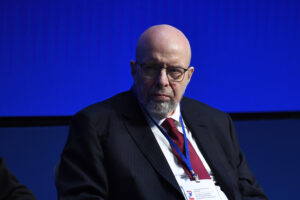A Culture in Decline

On a basic level, the answer to the question of whether America is in decline is a simple one. In the eyes of American culture, America is in perpetual decline. Certainly since Watergate, an event that generated an undying atmosphere of suspicion, paranoia, and relentless critique, the evening news seems like it was written by Emil Cioran and taped by Joseph Beuys. Clerics, physicians, educators, politicians, entertainers, athletes—all are crashing to earth along with plodding hegemonies like gender, race, and sexuality. One can imagine a contemporary Norman Rockwell producing a painting of a child with their parent, both carrying fishing rods and pails, off on a weekend jaunt into the city, entitled “Going Unmasking.” Or a present-day Lincoln delivering their Second Inaugural Address in two words: “Yeah, right.”
And this, in American terms, is as it should be. Proclamations of civilizational decline are proof of civilizational health. Enforced sunniness is the style of autocrats and dictators. “Socialist realism” was synonymous with a soul-crushing lie about human progress through solidarity. The American realism of Ashcan School painters like John Sloan and George Bellows, and of the great realist or naturalist writers like Melville, Wharton, Twain, Sinclair Lewis, James Farrell, Dreiser, Wright, and Ellison told a truth about the human ego, free, in American terms, to make or unmake itself—or, in the manner of Gatsby, both at the same time.
As the sweeping social novel vanishes altogether, the media supplies our gritty realism nowadays. Babbitt sprang from the imagination of a novelist. Trump seems to have been born in the womb of the news. Yet such figures, fictional or real, serve American purposes. The strobe lights emitted by dark psyches are our optimistic beacons of light. We perform minute-by-minute national salvations by exposing damnable national figures to the happy endings of analysis and critique. And, again, how could it be otherwise? The essence of modern democracy is to tame the inherent adversarialism of social life and build it, day by day, into a civilizational style, reinforced by the boundaries of gossip just as much as by the forms of popular and high art. An ebullient plaintive captiousness is our true national anthem. The purpose of Phidias’s statue of Zeus was to inspire awe and terror that would bind and regulate a community. The purpose of Rothko’s floating rectangles in the Four Seasons restaurant was, the artist said, to “ruin the appetite of every sonofabitch that eats in that room.”
Shift the perspective slightly, though, and a culture that celebrates the exposure of decline or strife in every national nook and cranny could be just that: not evidence of national energy and freedom but the central symptom of decline itself. It could be that the sort of triumphal illumination of a dark American underside that you encounter, again and again, in American culture—The Scarlet Letter, Grapes of Wrath, American Psycho, Succession—is simply the extended inner chronicle and long gestation of the collapse of an empire. The worm at the heart of American democracy is American democracy.
You could find that idea of entropic democracy during the 1980s, in the work of Saul Bellow and Philip Roth, among others. For them, writers trapped in the asphyxiating universe of Soviet totalitarianism possessed an inner freedom and truth that their Western counterparts lacked. Solzhenitsyn displayed this jaundiced view of Western democracy in the famous 1978 commencement address that he delivered at Harvard. There he railed against the “destructive and irresponsible freedom” and the “abyss of human decadence” he found in the West, especially America, all of which led to the universal triumph of “mediocrity.” At Harvard, on the cusp of the collapse of the Soviet Union, in the world’s most powerful country, before an audience of elites and the next generation of elites, Solzhenitsyn saw nothing but decline.
Of course what Solzhenitsyn might well have meant was that America offered no material to a novelist steeped in the tradition of Dostoyevsky and Tolstoy. American culture was too super-psychologized to offer grist for novelistic mining of inner life. Radical individualism offered no opportunities to raise individuals into sharp relief. Capitalism’s normalization of the byways of self-interest presented no possibilities to explore the hidden byways of human greed. Solzhenitsyn’s animus was an updated version of the antipathy great modernist writers like Eliot, Pound, Yeats, and Henry Miller had harbored toward democracy. As vast numbers of people across the globe persisted with lives slowed to a crawl by sweltering and stifling climates, Miller blithely called America “the air-conditioned nightmare” in his book of that name. Wyndham Lewis, who would fall in and out of love with Hitler, coined the term “moronic inferno” to describe what he regarded as the befuddling and chaotic shallowness of liberal democratic culture. Bellow admired Lewis’s animadversions against democracy.
The left reached strikingly similar conclusions. Frankfurt School thinkers like Marcuse and Adorno associated American mass culture with the fascist homogenizing of a national will (Adorno worried that jazz was a dangerous “disenfranchised subjectivity”). For them, mass culture produced ever creative new forms of what Herbert Marcuse called “repressive tolerance.” That is to say, every new idea, or cultural form, that society accepted only served to repress any alternative idea or cultural form that represented an expansion of freedom that official culture found intolerable. From comic books, television, and film to the “sexual liberation” of the 1960s, society was tightening its grip by expanding its embrace. In the 1970s, Foucault revised the Frankfurt School critique into exquisite notions of subtle, ubiquitous, inescapable forms of power.
On both left and right, then, what ordinary people regarded as everyday triumphs of science and technology, artists and intellectuals, in one degree or another, have seen as symptoms of profound intellectual, artistic, and spiritual decline. As Wyndham Lewis was ringing changes on his notion of the moronic inferno, American women won the right to vote, American labor laws were passed protecting children and granting workers the right to form unions, and the invention of penicillin took some of the hell out of life for vast numbers of people. Lacking new generations of Dantes and Shakespeares, they gained years of freedom and life.
Whichever way you look, the question of whether America is in decline, which is the question of whether American democracy is in decline, poses a riddle. The most foreboding and most paralyzing declarations of decline are the mark of civilizational health. Or they are, and have always been, the silent symptom, gradually becoming apparent, of that crippling anti-democratic disease known as … democracy. Could it be that American civilization has always been riding a historical wave of material progress while, at the same time, sinking slowly into depths of spiritual and intellectual malaise? Is this America’s Faustian bargain? And, if so, how long before the latter decline overwhelms the former advance?
Jimmy Carter made his famous malaise speech in 1978, as it happens just weeks after Solzhenitsyn delivered his searing judgments in Cambridge. Carter spoke of the “growing doubt about the meaning of our own lives and in the loss of a unity of purpose for our Nation. The erosion of our confidence in the future is threatening to destroy the social and political fabric of America.” He concluded by urging his fellow Americans: “[W]henever you have a chance, say something good about our country.” Although the popular response to Carter’s address was extremely positive, Carter’s sentiments vanished amid rising interest rates and unemployment and the disappearance of entire industries, not to mention the ongoing Iran hostage crisis. Ronald Reagan turned the speech against Carter, arguing that the president was blaming the American people for problems he himself had promised to “fix.”
But Carter gave the speech 46 years too early. Someone might well revise it with greater success. The American people no longer like the American people very much, from those on the right who wish to return to a chimeric golden age, to those on the left who desire to establish a frictionless social utopia. Pound, Eliot, and all the rest, the Frankfurt School, Foucault’s refinements—they are now the stuff of a kind of American folk nihilism, a nihilism in the streets, present along a spectrum that encompasses both MAGA and woke despair. Movies, TV, popular music, late-night comedy all abound with what was once a rarefied radical skepticism of democratic freedom, stable meaning and values, and every form of power. The “theater of cruelty” devised by Antonin Artaud has nothing over HBO.
That Americans doubt there is meaning in their lives beyond money and material success, that they have no undivided, collective sense of America’s purpose, that American confidence in the future has not just eroded, but vanished, goes, at this point, without saying. In the most advanced circles, on both right and left, saying something good about America would have the same toxic effect as, in the former Soviet Union, saying something bad about the communist regime. In a sense, Trump’s glowering vision of an America overrun with undocumented immigrants, beset by rampant crime, crippled by Marxist elites is really just a businessman’s quantification of Solzhenitsyn’s and Carter’s jeremiads aimed at the American spirit. And it worked.Every parent knows that when a child comes to you with any kind of fear, you don’t tell them that their fear is unfounded, thereby making them feel not only afraid, but isolated and misunderstood. You acknowledge their fear, tell them you understand why they are afraid, and then slowly work to rationalize their fear and help them put it in some kind of safe perspective. But Harris told America, essentially, that their economic, social and cultural fears were unfounded, that the country was well and full of “joy” and that the only thing to fear was her rival. It is no surprise that her rival, whose dark vision, for all its ugly distortions, contained more truth than Harris’s rosy denials, carried the day. The country needed two strong hands on its shoulders, not a laughing pat on the back. Now it remains to be seen just how strong those hands will be.
There are obvious markers of a country’s decline. Rates of poverty, suicide, and mortality say a great deal about a country’s health. America shamefully lags behind other developed nations in all of these. Other measurements exist; we all know them from reading the news that streams toward us from every direction, as if the fountains of Rome suddenly spouted turbid water all at once, perpetually. But these trends rise and fall. The emptiness Carter spoke about, so surprisingly for a president, the absence not so much of meaning but of certainty, of continuity, of a national purpose that is available, humanely, to the individual—all of that is the true measure of a civilization’s health. Empires rot, without exception, from within, no matter the magnitude of their preeminence—politically, economically, militarily—on the world stage. The problem is that it is impossible to measure the interiority of a civilization. It has to be intuited, extracted from certain specific, but representative, instances.
To my mind, Solzhenitsyn notwithstanding, the three most important novels of the past two decades have been Karl Ove Knausgaard’s “My Struggle”—dubbed by its publisher an “autobiographical fiction”—Elena Ferrante’s “My Brilliant Friend,” and Rachel Cusk’s “Outline.” What makes these books exceptional is that they all find imaginative truth not in the abstractions of postmodernism, or in the concrete fidelities of realism, but in a return to myth.
Knausgaard frankly compares his semi-fictional self to Prometheus. Ferrante retells the story of the Iliad, casting her own fictional persona as an anti-Achilles wreaking a literary vengeance on her old friend, and on a patriarchal society’s culture of vendetta. And Cusk’s narrator seems to identify herself, at the end of the novel, pointedly set in Greece, as an immortal, headless statue of a goddess (instead of losing her head over a man, she loses it over Western civilization). For these European writers, civilizational crisis is defined by a collective inability to find shared truth. For them, the old facts are as worn out as the old faith. What is required, at a post-Enlightenment time when individual empowerment threatens to extinguish the humanity of the individual, is some new place beyond facts and faith, built up out of an individual life, yet free from the limits of individuality.
Great artists stand in the vanguard of their time and reflect truths that exist far beyond their place. These three books, all critical and commercial successes in the United States, are illuminations of the slow inward-turning motion of American civilization. If America is in decline, and I believe that increasingly is the case, it is because the American ego now exists, you might say, auto-religiously. As in the creation of a myth, people fictionalize facts for the sake of a larger truth, that truth being unlimited, untrammeled mental and physical gratification.
Private gratification has become a public style and, in the process, dissolved what remained of public life. An example from public life: Not a day goes by when, if you spend a few hours driving around in a relatively populated place, you will not see at least three or four drivers either speed through a red light or blow past a stop sign. No other Western country has this experience. When masses of people rearrange the facts to suit their pleasure, limits and boundaries rooted in shared social realities disappear. The right defies science. The left defies biology. The right defends lying for the sake of free speech. The left defends censorship for the sake of free speech. Both sides define as freedom anything that limits the range of motion on the other side. And neither side believes even the most factually supported arguments of the other. It is, rather, myth against myth.
In this new socialized solipsism, the only strategy left for making cognitive sense of life is to associate truth with whatever is least obstructive to desire, and to associate falsity with a threat to satisfaction. But it is not at all, as people say, that each side mistrusts “the science.” It is that both sides are so certain that science will ultimately keep them safe that they feel they can defy science without consequence. If you are convinced the Covid vaccine will kill you, or perhaps put you under the control of the government, you will still run to the doctor or the emergency room if you fall ill with Covid. And the most committed transgenderist on the left trusts, absolutely, biological procedures to make right what biology got wrong.
Unmoored, mistrustful, wallowing in personal pleasure, turning anomie into a flamboyant, personal style, replacing faith with fantasy—living, to repeat, auto-religiously—the American ego still requires newfound certainties. Sixty-five years ago, C.P. Snow delivered lectures that became his influential book The Two Cultures and the Scientific Revolution. There he argued that science and the humanities had come to inhabit parallel realms that could no longer understand the other’s practices, meaning, or values. He did not, though, declare a victor, preferring to warn instead about the consequences for civilization of such a bifurcation of fundamental approaches to reality. But in our era, a victor has emerged.
We live in a time that is being almost entirely determined by quantifications of one sort or another. There are the algorithms and the burgeoning AI that rule our lives. The correct doses of psychiatric drugs that regulate our moods. The data on infectious disease that decide the manufacture, delivery, and pacing of vaccines. The endless surveys and polls that tell us who we are. The “metrics” that decide what form the news takes, and what content it conveys.
Remarkable advances in medicine are making life healthier and longer. At the same time, art’s nuances, complexities, ambiguities, its inarticulable truths available only to the intuition have ceased to become autonomous forms of knowledge and feeling. Instead art has been quantified, along with everything else, into neat correlations to a specific group of people or cause. It could well be that as life becomes longer, art’s unique forms of knowledge and feeling are simply regarded as onerous. (And totalitarian politics always elevates biology over art. That is another subject.) But it is no longer the case that science and the humanities inhabit parallel realms. It is that art and the humanities are being recast as experiences available not to the judgment of taste, but as experiments waiting for the verifications of social data. As Americans turn inward, they are surrendering their imaginations, and their moral imaginations, to an impersonality that exists above and beyond their lives, but an impersonality without either ethical or esthetic attributes. An impersonality that, unlike God or art, can be verified by scientifically proven criteria.
To put it another way, as the accelerating templates of geopolitics spin the continents of history into whirling new savageries and threats of total annihilation, Americans are attempting to extinguish whatever makes them human and therefore vulnerable to physical and mental pain. We are dumping our interiority as fast as we can, like pumping water out of a sinking ship. The smart money is racing to make Mars habitable, after all. Everyone else is, happily or not, making daily landings on planets of their own devise. And because declarations of decline have been part of the American promise for so long, either as proof of robust democracy, or as warnings of democracy’s fatal democratic flaw, American demise, like every American catastrophe, is simply something to be noted, endured, or profited by.
Lee Siegel publishes widely on politics and culture, and is the recipient of a National Magazine Award. His eighth book, Nothing Alien: Writings 1989–2024, will be out next May.


